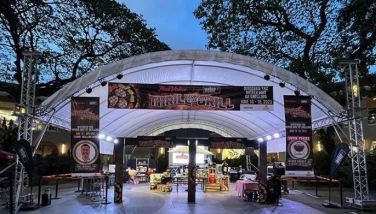Economies of scale? Dream on!

Upon arrival in Taiwan two weeks ago, the first to “greet” us was a young man holding up a sign that read: “FILIPINO CONTRACT WORKERS IN TAIWAN – BAKASYON – NON-PICK UP – PILA PO DITO SALAMAT.”
I smiled and walked on but decided to go back to him and ask what office he worked for. I mistakenly assumed that it would be the Manila Economic and Cultural Office, but it turns out that he represented the DOLE or Department of Labor-Phl and the service was for free. This simple service made me appreciate government. Congratulations to DOLE Taiwan and to Secretary Benny Laguesma.
Walking out of the tube and corridor, I noticed a large stuffed dog that was a mascot of some sort and when I read the notice it said: “Do not bring meat products into Taiwan.” It had a drawing of a plane with a pig on top of the plane and a smaller wild pig riding piggyback representing ASF or the African swine fever. Below all that was the most important message: “The maximum reward for report reaches NTD5 Million.” (Almost P10 million)
The same mascot and warnings were placed above the luggage carousel as well as areas of high visibility as a warning to passengers and to people seeing off others or doing business at the airport. On our return flight, the China Airline crew announced that they would have to spray the floor as well as shoes of passengers as a deterrent to the ASF virus. During one of our day tours, I noticed a similar sign advising persons who have traveled to a farm recently to inform personnel, again to prevent the spread of disease.
All these precautions reflect the destructive impact of ASF, the consequences of weak or half-hearted response and the need for continuous control measures. While the Philippine government has conducted a lot of dialogues, warnings and status reports on ASF cases all over the country, the Department of Agriculture has not done enough consultation or shared with ALL stakeholders the big-ticket items that are designed to restore the hog raising industry to its pre-ASF and pre-pandemic state.
If the vaccine ever comes out before all the pigs are wiped out, the government’s direction is for hog raisers to fork out P1,200 for two doses of the vaccine. The ideal number of piglets per litter is 12 to 14 piglets, that equals P14, 400 to P16, 800. If each piglet sold at the “wish ko lang” price of P5,000 pesos, you’re left with P3,400. When you factor in feeds, electricity, water, medicines and vitamins for two months, you lost money on every piglet.
The problem of hog raisers is not limited to preventing ASF. Even with a potential vaccine on the horizon, many former raisers remain unconvinced to get back in the business because it has been ruined and undermined by capitalist traders who buy imported pork, fill up all the cold storage facilities they control and flood the market with pork that was slaughtered, chilled, shipped and frozen starting from two months ago.
In the meantime, the national government is more concerned with pleasing consumers and campaign contributors instead of creating a level playing field for farmers and livestock producers. Instead of tapping major food and livestock corporations, we are now rolling out the red carpet for foreign companies to compete with Philippine dairy producers, coffee producers, feed millers and distributors.
The national government’s excuse is because we have entered into treaties and trade agreements, so we must open our markets. But what about tax breaks, incentives, subsidies or simple technical and stock support?
This is why opinion writers and industry leaders have been pushing for the Department of Agriculture to establish training and breeding facilities for hog raising in every region, do more about bio-security training for all, especially backyard raisers whose production used to cover 65 percent of the country’s demand for pork.
Then follow-up with repopulating backyard farms by implementing the time old dispersal formula where a recipient of a female piglet or sow is required to turn over a third of future litters or female piglets up to two cycles for redistribution or dispersal to other raisers. All these can be introduced or implemented by farm extension workers and would surely be welcomed, even by politicians as well as LGUs because it revives the livelihood, generates employment and is a more affordable formula for repopulation. It also makes politicians popular!
Lack of knowledge, training and the now prohibitive costs of acquiring livestock for breeding and propagation are the leading reasons why agriculture has taken a serious blow. Government policy and activities have moved farther and farther away from their most important stakeholders: farmers and backyard producers.
There is also the fallacy or the persistent focus on “economies of scale” as a necessary requirement to justify doing something. The so-called experts and economists say that we need to integrate land, do corporate farming in order to have economies of scale. They have said that time and time again, but have not achieved any real “economy of scale” or any actual integration that is legitimate and pro-farmer. They simply say, “It can’t be done” and do nothing more.
Well, what about accepting that we will simply have to do patchwork farming or plot size agricultural development, increase the knowledge of farmers, equip them with what they really need, improve their quality of life and step back and view the quilt that naturally comes together.
Why is it that when a rich retired executive or millionaire’s wife gets into hobby farming with one or two hectares, they say it’s cool, etc. but when it’s a poor farmer, it isn’t! It is the person who owns it who will do the most work, not the economists and politicians who only talk but get nothing done!
* * *
E-mail: [email protected]
- Latest
- Trending


























